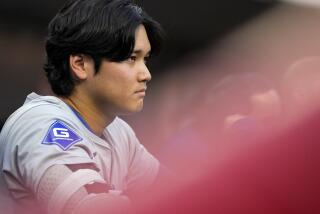Hoyt’s Padre Career Ends in Jail as Team Seeks to Release Him
- Share via
SAN DIEGO — The San Diego Padres, who mean it when they say, “We want a clean team,” asked waivers Wednesday on imprisoned pitcher LaMarr Hoyt for purposes of his unconditional release. Assuming he clears waivers, Hoyt--who is serving a 45-day prison sentence on Eglin Air Force Base near Pensacola, Fla.--would become a free agent Monday.
The Padres waived Hoyt Wednesday for two reasons. First, it has been their policy in recent years to trade or waive players who have had continuing problems with drugs. Owner Joan Kroc has said it is her sacred vow to have a team free of drugs.
So in 1985, they traded second baseman Alan Wiggins, who fought cocaine dependency, and now they have waived Hoyt, who twice in the last year was arrested for possession of tranquilizers and painkillers.
Secondly, Hoyt was due to get the first paycheck of his 1987 $1-million contract on Jan. 15. The Padres, who think Hoyt breached his contract by being involved with drugs, do not intend to pay him a dime. Hoyt, 32, has three years remaining on his contract (worth approximately $3 million).
According to Arthur Shack of the Major League Players’ Assn., Hoyt can file a grievance against the Padres demanding to be paid.
“It’s now LaMarr’s move,” Shack said.
Ron Shapiro, Hoyt’s Baltimore-based agent, would not comment Wednesday.
Kroc and Ballard Smith, the Padre president, wouldn’t comment either. Smith said there might be litigation over whether the Padres should pay Hoyt, and he thought it would be best to not comment.
Hoyt’s attorney, Howard Frank, said he doubted Hoyt was aware he’d been waived.
“He’s in custody,” Frank said Wednesday. “People in custody don’t get phone calls.”
However, sources close to Hoyt didn’t think he would be too upset over Wednesday’s development. After spending 30 days at a drug rehabilitation center last spring, Hoyt--who won the 1983 Cy Young Award as a member of the Chicago White Sox--said it might be best for him to leave the Padres.
Certainly, Wednesday’s announcement comes as no surprise. After Hoyt’s first arrest--last February at the San Ysidro border--he had been warned by Smith not to let it happen again. And when it did, Padre sources said his release almost became inevitable.
In a statement issued by the team, Padre General Manager Jack McKeon said: “Our organization has been consistent in these matters. LaMarr was aware of of the club’s policy and had been previously warned about the situation. We hope that LaMarr will be able to find a solution to his ongoing problem. We wish him only the best in the future.”
Hoyt could be claimed by any major league team before Monday, but that is unlikely considering the team would be responsible for his contract. After Monday, a team can sign him at its own price.
Of course, Hoyt’s baseball future is in the hands of Peter Ueberroth, the commissioner of baseball. Ueberroth, who is expected to make an announcement in the next few days, could decide to suspend Hoyt, fine him or both.
But Frank thinks Hoyt’s case is different from Wiggins’ because Hoyt “is not a drug addict or recreational user.” Instead, Frank said Hoyt is “someone with a diagnosed medical problem.”
For example, it was learned in Hoyt’s recent drug trial that he has had a sleeping problem and had been prescribed Valium tablets by a doctor in his hometown of Columbia, S.C. He then ran out of the Valium tablets, and--in the midst of a divorce--panicked and went to Mexico to purchase more, illegally. There, he was arrested twice.
“Here was a sick man, crying out for help,” Frank said in court.
Regardless, Hoyt’s two-year career with the Padres is over. The first was better than the last. In 1985, he went 16-8 with a 3.47 earned-run average and was the Most Valuable Player in the All-Star Game. But in 1986, after missing most of spring training, his record dropped to 8-11 with a 5.15 ERA.
More to Read
Go beyond the scoreboard
Get the latest on L.A.'s teams in the daily Sports Report newsletter.
You may occasionally receive promotional content from the Los Angeles Times.










